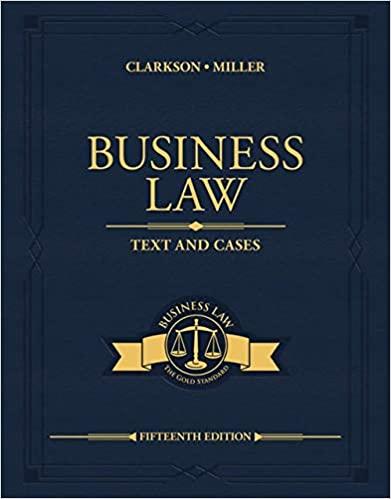Question
Hi, Please give me all the answers of the following questions (MCQ) 1. Regarding searches and seizures, the Supreme Court has ruled that: We have
Hi,
Please give me all the answers of the following questions (MCQ)
1. Regarding searches and seizures, the Supreme Court has ruled that:
We have a right to privacy in circumstances where we have a reasonable expectation of others not having access to our information
We have a right to privacy only for our financial information
We have a right to privacy, but only within our homes and hotel rooms
We have a right to privacy in any circumstance we feel is out of bounds
2. The Supreme Court has interpreted the prohibition on cruel and unusual punishments to mean:
That capital punishment is barbaric
That mandatory life imprisonment for first degree murder is a suitable punishment
That capital punishment is justified for first degree murder
None of the above
3. The following is NOT a way that governments can abuse their crime deterring authority:
Convicting the innocent
Targeting unpopular individuals
Ensuring that suspects are presumed innocent
Applying vague and complex laws
4. The Charter does:
Not permit random spot checks of drivers
Permits random spot checks of drivers, along with full searches of vehicles at the full discretion of the police officer
Permits random spot checks of drivers, along with a demand for license, insurance, and ownership documents
Only allows police to stop drivers that are swerving back and forth on the road
5. Generally speaking, according to the Supreme Court's interpretation of the Charter, in order for the police to conduct a search, they:
Don't need any evidence whatsoever that a crime will be uncovered through a search
Have to be 100% certain that a crime will be uncovered through a search
Require a warrant from a judge
Both (b) and (c)
6. The difference between the crime control and due process models is that:
Crime control focuses on the rights of criminal suspects, whereas due process emphasizes the capture and conviction of criminals
Crime control focuses on the capture and conviction of criminals, whereas due process is oriented around the rights of criminal suspects
Adherence to the Crime control model has been more prevalent since the Charter came into effect, whereas due process tended to be emphasized prior to the Charter
Both (b) and (c)
7. With respect to the right of disclosure:
Both the prosecution and defense have to disclose their evidence to the other side
Only the prosecution is obligated to disclose their evidence to the defense
Only the defense is obligated to disclose their evidence to the prosecution
None of the above
8. The following is NOT something that the Supreme Court has defined as part of fundamental justice:
Right to silence
Right to full answer and defense
Mens rea
Right to plead the "fifth"
9. To deal with crime, governments possess:
A monopoly on the legitimate use of coercion
The power to levy fines
The ability to imprison individuals
All of the above
10. Habeus corpus means:
That anyone detained must be brought before a judge to have their case evaluated
That the police can detain people for long periods of time without bringing them before a judge
That a witness to a crime can be forced to testify in court
That anything a person says in court can be used against them in future legal proceedings
Step by Step Solution
There are 3 Steps involved in it
Step: 1

Get Instant Access to Expert-Tailored Solutions
See step-by-step solutions with expert insights and AI powered tools for academic success
Step: 2

Step: 3

Ace Your Homework with AI
Get the answers you need in no time with our AI-driven, step-by-step assistance
Get Started


